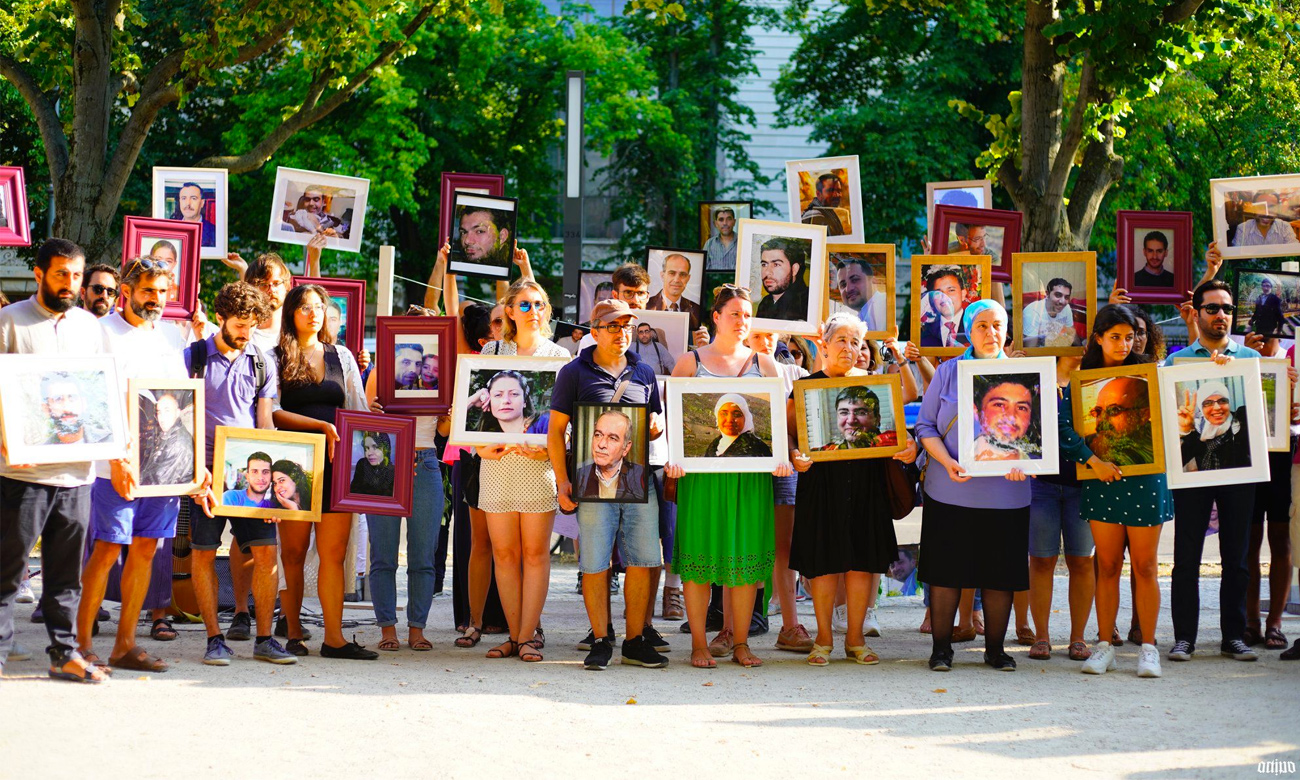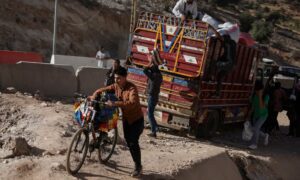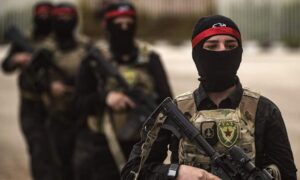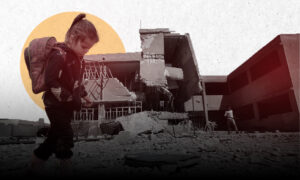On the International Day of Victims of Enforced Disappearance, Anas remembers his friend, Abu Emad, who has long been held in the Syrian regime’s detention centers.
Six years have elapsed since his disappearance and there are still no news about his whereabouts or what happened to him, despite many attempts by his family and friends to know anything about him.
In February 2013, 21-year-old Abu Emad was arrested for his peaceful activities. Six months after his disappearance, a friend left the prison to tell his family that he was with him. Since then, all his lawyer sister’s attempts to get in any update on his situation have failed, although she tried all possible ways.
The story of Abu Emad is one of thousands of stories of families who are trying to get any news about a missing member that would reassure their hearts burnt by the fire of absence. A hope that sometimes increases when they hear that someone has heard about their missing person or seen him in a security branch yet fades away with their inability to ascertain everything that may be said amid the exploitation of some opportunists of their situation.
To Enab Baladi Anas recounts the memories with his friend, and the tiredness that may have befallen him during his prolonged detention, while he is suffering from diabetes. “When we hear about a campaign to release the detainees, we go out early in the morning carrying out some clothes to wait at the door of the Damascus police headquarters, only to find that Abu Emad had already gone there before us. Even when we agree not to tell him to go, for fear that he would get tired, we find him already in the place of gathering,” said Anas.
“Abu Emad has not felt tired of standing up and waiting, but today he is certainly feeling very tired as he has not gotten the insulin he needs,” Anas added.
Abu Emad’s sister has been unable to obtain any information about him, despite her repeated questions at the Damascus police headquarters, the Justice Palace, Sednaya Military Prison, the military police and the military judiciary, only to be answered that they do not have someone with such a name, although no death certificate about him was issued in the personal status department. Those who have forcibly arrested him and caused his disappearance have also worked on denying his existence.
Difference between detention and enforced disappearance in international treaties:
Arbitrary Detention: Detention of persons without legitimate reason or without legal procedure, usually preceding disappearance.
Enforced disappearance is defined by three elements:
– Deprivation of liberty against the will of the concerned person.
– Involvement of government officials, at least with implicit acceptance.
– Refusal to acknowledge the deprivation of the person of his liberty or the concealing of the disappeared person’s fate or whereabouts.
Terrifying statistics
As one of the instruments of war, the Syrian conflicting parties used enforced disappearance, in an attempt to pressure opponents and to hide facts.
Over the past eight years, many human rights reports have talked about thousands of disappearance cases, in an attempt to push action forward in the sensitive file, in which no party has so far succeeded in making progress, amid the conflicting parties’ denial of the existence of disappeared people with them and their discretion about any information that may contribute to reaching them.
Amid the difficulty of obtaining accurate figures, the Syrian Network for Human Rights (SNHR) reports that there are at least 98,000 enforced disappearance cases in Syria by key acting parties, from March 2011 to July 2019.
Obstacles facing the documentation of the disappeared
Nour al-Khatib, who is in charge of the detainees file at the SNHR, explained to Enab Baladi that the Network’s statistics are based on the database of detainees and the forcibly disappeared people that it has worked on over eight years, relying on multiple sources, including SNHR members deployed in the governorates, local activists, the victims’ families, and the survivors from Syrian prisons and detention centers themselves. The Network has also allocated documentation links and contact numbers to facilitate access to the largest possible group of families, survivors, and witnesses.
Al-Khatib pointed to many difficulties the organization is facing in this process, the most important of which is the Syrian society’s lack of faith and hope in the feasibility of documentation operations as a result of the international community’s turning their back to this file and their failure to implement the decisions it issued on the detainees and disappeared. This requires those working in this field to increase efforts to raise the awareness of the families and citizens about the importance of documentation in achieving justice and accountability.
In addition, we must not forget security challenges and the risk that those working in the documentation of violations can face in different Syrian regions.
Al-Khatib stated that the international bodies, which have recently obtained the SNHR’s statistics for the purpose of pushing forward the file of the enforced disappearances in Syria, are the Independent International Commission of Inquiry on the Syrian Arab Republic, the International Impartial and Independent Mechanism (IIIM), the Office of the High Commissioner for Human Rights (OHCHR), the Working Group on Arbitrary Detention, by documenting cases via their own forms, along with Amnesty International, Human Rights Watch, and other bodies.
Neutralization of the file of the disappeared from political tensions
Amid absence of any tangible progress in the file of the disappeared and detainees, questions arise as to why the international community has ignored these horrible statistics, and the efforts that reach local and international human rights organizations.
Ibrahim al-Qassim, Executive Director of the Caesar Files Group, considered that there is no seriousness in solving the issue of detainees, their release, and revealing the fate of the forcibly disappeared people.
Speaking to Enab Baladi, he pointed out that this issue does not require political negotiations or to be turned into a politically negotiable file subject to tensions, or turned into a pressure card between the parties, as this violates the rights of victims of the crimes of arbitrary detention and enforced disappearance.
Al-Qassim believes the only solution to this case is to release all detainees, uncover the fate of the ones who disappeared, and hold accountable those responsible for these crimes.
Human rights organizations’ contribution to the forcibly disappeared file
Regarding the efforts of Syrian and International Human rights organizations exerted to push the file of enforced disappearance forward, the Director of the Syrian Center for Justice and Accountability, Mohammed Al-Abdullah, told Enab Baladi that the latest of these efforts revolved around trying to pressure the Security Council to issue a resolution on Syrian detainees. The same resolution should call for their release, disclose the fate of the deceased and the causes of death, hand over the bodies to their families, allow international and medical organizations to inspect the situation in prison, and provide lists including the names and numbers of detainees.
He pointed out that one of the worst issues related to the Syrian case is the unknown number of missing people despite the existence of rough figures offered by some organizations. However, much information about them remains unclear.
Al-Abdullah pointed out that during conflicts the government shall assume the responsibility of preparing, issuing, publishing, or handing over lists of the names of detainees to the families and international organizations. Therefore, pressure on the Syrian government must be exerted. He also indicated that they will take these demands to the United Nations General Assembly, which will be held during the month of September.
International action
Al-Abdullah referred to the UN Security Council Resolution N°2474 tackling the people missing during conflicts adopted last June as the first to address enforced disappearances and missing persons in the world. Therefore, human rights organizations are working to exert pressure on the Council on Syrian detainees to pass a resolution. Meanwhile, this may result into tangible outcomes regarding the issue of Syrian detainees, but does not necessarily mean the release of detainees as quickly as required, Al-Abdullah said.
The Director of the Syrian Center for Justice and Accountability pointed out that the legal framework governing the issue of enforced disappearance is made clear in the Geneva Conventions, international humanitarian law, and human rights law, as it is identified as a violation and an indefensible “war crime”.
On June 11, 2019, the UN Security Council unanimously adopted Resolution N°2474 to address the issue of missing people as a result of armed conflict, calling for the disclosure of their fate and the protection of civilians present in such areas. The council also encouraged parties to armed conflicts to look for missing people and facilitate the return of their remains.
Following the momentum created by Resolution N°2474, the Security Council held its first briefing on detainees and missing persons in Syria on August 7, 2019, during which both activists Amina Khoulani and Hala al-Ghawi testified and spoke on behalf of the families of missing and forcibly disappeared persons.
Criticizing Pedersen
Human rights movements were accompanied with other political initiatives, namely the file of the disappeared and detained being introduced during “Geneva” and “Astana” talks by current and former UN envoy, Geir Pedersen and Staffan de Mistura. The most recent statement made by Pedersen a few days ago declared that the Constitutional Commission, which is currently being launched, must be accompanied by changes having an impact on the ground, mainly progress on as regards to the file of detainees and enforced disappearances.
Al-Abdullah believes that Pedersen’s statement comes in isolation of the efforts of human rights organizations and considers it to be only reassurances without making any real efforts. Ever since he declared the issue of detainees and missing persons to be a priority for him during his first briefing after being appointed to this position, he did nothing and provided no updates involving the activities and efforts related to the issue of detainees.
To the day, the UN envoy’s office shared no plan with the organizations or residents on the issue of detainees. Worse still, Pedersen did not try to restore the file from the Astana talks and take it to the Geneva negotiations the way de Mistura proceeded.
Exchanging prisoners rather than releasing detainees
Al-Abdullah stressed the need to take the file back to “Geneva” because the transfer led to ignoring the role of human rights organizations and neglecting the families of detainees. Additionally, the legal framework in “Geneva” is clear, for there is an “International Commission of Inquiry affiliated to the Human Rights Council, which could contribute to providing the UN envoy’s office with data and information and offering briefings. Besides, the Office of the High Commissioner for Human Rights, can exert pressure to push negotiations forward.
In contrast, the debate in Astana is limited to three countries, namely Iran, Russia, and Turkey, which are not considered to have a positive impact in this file, according to al-Abdullah. These discussions also focused on the small-scale exchange of fighters war prisoners and faction detainees. These exchange deals lacked transparency, as they dealt with releasing fighters rather than detainees.
Al-Abdullah stressed that moving to solve the issue of detainees and missing people must be a prerequisite for any serious peace negotiations or talk about the return of refugees to their country.
if you think the article contain wrong information or you have additional details Send Correction
النسخة العربية من المقال
-
Follow us :


















 A
A
A
A
A
A









 More In-Depth
More In-Depth